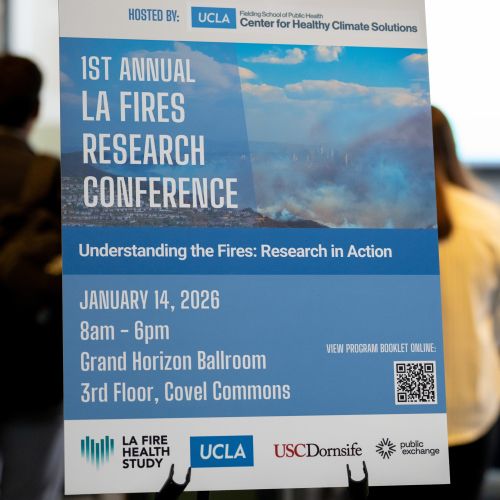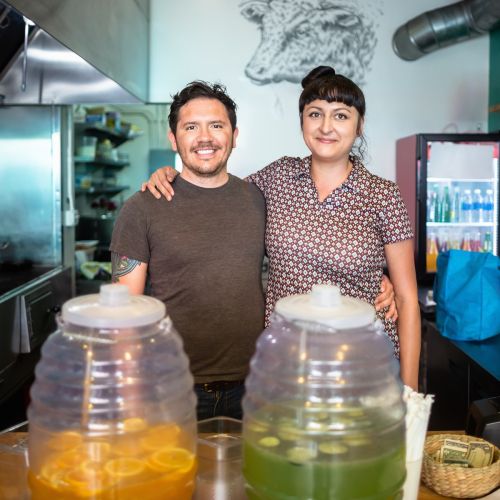How are pesticides and Parkinson’s disease linked? One doctor's research spans 25 years
Dr. Beate Ritz’s research in California’s Central Valley highlights the role of the environment in the neurodegenerative disorder.

While Dr. Beate Ritz, professor in the UCLA Fielding School's departments of Epidemiology and Environmental Health Sciences, was undergoing training in psychiatry in Germany, her 62-year-old department chair developed Parkinson’s disease. It progressed rapidly.
“When I naively asked what causes Parkinson's,” Ritz recalled, “everybody said, ‘We don't know.’”
That question began more than 25 years of research into the neurodegenerative disorder for Ritz.
She would eventually narrow her focus to one of California’s hubs of agriculture: the Central Valley.
Her Parkinson’s Environment Genes (PEG) research has shown associations between environmental exposures – both pesticides and air pollution – and increased risk for developing Parkinson’s disease, an important step toward determining its causes.
She is a distinguished professor of epidemiology in the UCLA Fielding School of Public Health and a professor in the department of neurology at the David Geffen School of Medicine at UCLA.
Ritz’s work is increasingly critical as Parkinson’s – for which there is no cure and only symptomatic treatment – is the fastest-growing neurological disease worldwide.
Pesticides exposure
Examining the environment as a possible cause for Parkinson’s began in the late 1980s, with “frozen addicts.”
After injecting a synthetic heroin, these individuals were found to have severely limited movement and speech. The drug was contaminated with a chemical similar to paraquat dichloride – a commonly used herbicide.
Ritz employed a unique resource – California’s Pesticide Use Reports – that allowed her to precisely gauge the pesticides being sprayed on acres of fruits and vegetables in the Central Valley.
The compounds would then find their way into people through inhalation or ingestion (contained in dust or well water).
That exposure to paraquat was associated with an increased risk for Parkinson's disease, Ritz’s studies found.
Since then, several animal models have shown paraquat causing disease symptoms. “We are now basically convinced that paraquat can cause Parkinson’s,” Ritz said.
Additional analyses of hundreds of pesticides found that more than 10 were directly toxic to the neurons that produce and release the neurotransmitter dopamine. Her team is now analyzing which combinations of pesticides are particularly toxic.
Air pollution
Ritz’s latest studies have expanded to the role of air pollution.
As with pesticides, there are associations between increased disease risk and exposures to traffic-related pollutant markers such as carbon monoxide and the fine particulate matter found in dust.
Air pollution contains metals and is known to increase inflammation – both implicated in the immune dysfunction that partially drives Parkinson’s disease.
Another connection concerns the nose. A majority of those who develop Parkinson’s disease lose their sense of smell prior to diagnosis.
Ritz theorizes that an effect of pollution is that nanoparticles cross the nasal epithelium. They make their way to the olfactory bulb, then into the brain, and may therefore contribute to the development of Parkinson’s.
But she cautions that understanding air pollution’s effects on neurodegenerative diseases can be challenging.
That’s especially true when considering the varied influences of pollution sources, co-exposures, comorbidities and personal vulnerabilities.
Patient registry
When Ritz embarked on research into Parkinson’s disease, there was no way to measure its incidence or prevalence in California.
So she lobbied for a patient registry, joined by advocacy groups and colleagues in neurology such as Dr. Jeff M. Bronstein. The state passed a law in 2004 – finally funded in 2017 – that providers must report every patient with Parkinson’s.
Nearly 1,000 registered people with the diagnosis have enrolled in UCLA studies. A similar number – neighbors and community members without the disease – have volunteered to act as control subjects.
The registry has made the science possible and given the community a sense of agency, especially as “they feel they are suffering quietly and alone,” according to Ritz.
To inform the community of their contributions to progress, her team sends annual Christmas cards explaining their findings and summarizing what’s new in the field of Parkinson’s disease and patient care.
Policy changes
As Ritz and her team study the links between pesticides exposure and Parkinson’s disease, the hope is to progress from merely associating the two to establishing causation.
Ritz believes that delving deeper into cellular mechanisms will help in that effort, so “we actually see fingerprints of exposures on the human body.”
Whether causation can also lead to changes in policy – including reducing pesticide use around communities -- is another question.
Regulating insecticide is a cost-effective measure to reduce the burden of Parkinson’s disease, Ritz found in an analysis. But there are likely only two ways that industry will act, she pointed out.
One is an outright ban, a long process of convincing the Environmental Protection Agency. Ritz said.
California is much more open than the rest of the U.S. to pesticide regulation and to integrated options for pest management. But the state must also balance the sometimes-contradictory interests of the agriculture industry and community health.
Another route is legal action. Ritz is an expert witness in several lawsuits that allege paraquat exposure contributed to Parkinson’s disease.
Paraquat has been sprayed since the 1960s. Its use has even increased, as weeds become resistant to other herbicides.
More than 70 other countries have already banned it because of dangers to human health. However, legal and policy issues surrounding its use continue to be debated in the U.S. to this day.
Read the UCLA Health release.

